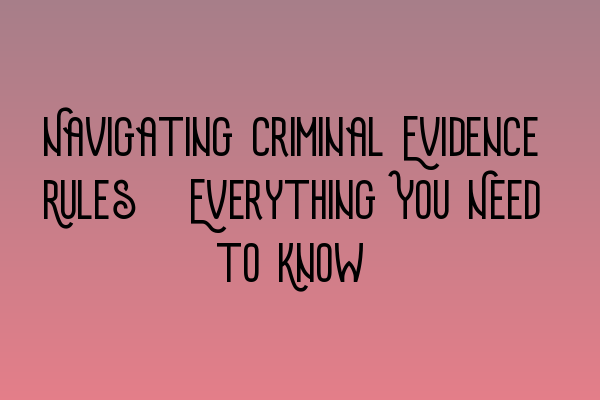Navigating Criminal Evidence Rules: Everything You Need to Know
Introduction
When it comes to criminal law and practice in the UK, understanding the rules of evidence is essential for success. As a solicitor, having a solid grasp of these rules will enable you to effectively navigate the complexities of criminal cases. In this blog post, we will provide a comprehensive overview of the criminal evidence rules and how to navigate them.
The Importance of Criminal Evidence Rules
Criminal evidence rules dictate how evidence can be presented and admitted in court. These rules are in place to ensure fairness, protect individual rights, and maintain the integrity of the criminal justice system. Understanding and adhering to these rules is crucial to building a strong case and presenting compelling evidence.
Types of Criminal Evidence
There are various types of evidence that can be presented in a criminal case. These include:
- Direct Evidence: Evidence that directly proves a fact, such as eyewitness testimony or video footage.
- Circumstantial Evidence: Evidence that indirectly infers a fact, requiring the jury to make a logical inference from the presented evidence.
- Character Evidence: Evidence that speaks to the character and reputation of the accused or the victim, which may be used to establish motive or credibility.
- Expert Evidence: Evidence provided by qualified experts in their respective fields, such as forensic scientists or medical professionals.
Admissibility of Evidence
Not all evidence is admissible in court. To be admissible, evidence must meet certain criteria, such as relevance, reliability, and legality. The court will assess the admissibility of evidence based on these factors and any relevant case law. It is important to thoroughly review and assess the evidence you intend to present to ensure its admissibility and strengthen your case.
Understanding Hearsay Evidence
Hearsay evidence is an important concept in criminal cases. It refers to statements made outside of court that are offered as evidence to prove the truth of the matter asserted. As a general rule, hearsay evidence is inadmissible, but there are exceptions to this rule. It is crucial to understand the exceptions to effectively navigate hearsay evidence and build a strong case. For more information on hearsay evidence, check out our SQE 1 Practice Exam Questions article.
Legal Privilege and Confidentiality
Legal privilege and confidentiality play a significant role in criminal cases. As a solicitor, it is crucial to understand the principles of legal privilege and maintain client confidentiality. Breaches of legal privilege or confidentiality can have serious consequences, impacting the admissibility of evidence and the overall outcome of the case. To deepen your understanding of legal privilege, consider our SQE 1 Practice Mocks FLK1 FLK2 article.
Expert Witnesses and Cross-Examination
Expert witnesses often provide crucial evidence in criminal cases. Understanding how to effectively cross-examine expert witnesses is essential to challenge their credibility and opinions. Adequate preparation, knowledge of the subject matter, and strategic questioning can significantly impact the outcome of the case. To enhance your skills in cross-examination, explore our SQE 2 Preparation Courses.
Conclusion
Navigating criminal evidence rules is a complex yet vital aspect of criminal law practice in the UK. By understanding the types of evidence, admissibility criteria, hearsay evidence, legal privilege, and expert witnesses, you can build stronger cases and effectively navigate the intricacies of the criminal justice system. For further resources and information on SQE preparation courses and exam dates, please visit our website: SQE 1 Preparation Courses and SRA SQE Exam Dates.
